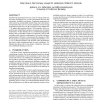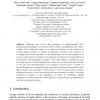349 search results - page 15 / 70 » Improvisation principles and techniques for design |
ACMICEC
2007
ACM
13 years 11 months ago
2007
ACM
Humans are "smart components" in a system, but cannot be directly programmed to perform; rather, their autonomy must be respected as a design constraint and incentives p...
VW
1998
Springer
13 years 11 months ago
1998
Springer
Arti cial life might come to play important roles for the World Wide Web, both as a source of new algorithmic paradigms and as a source of inspiration for its future development. N...
CIDR
2011
12 years 11 months ago
2011
Distributed programming has become a topic of widespread interest, and many programmers now wrestle with tradeoffs between data consistency, availability and latency. Distributed...
JFR
2007
13 years 7 months ago
2007
This paper describes two steps in the evolution of human-robot interaction designs developed by the University of Massachusetts Lowell (UML) and the Idaho National Laboratory (INL...
ECOOP
2007
Springer
14 years 1 months ago
2007
Springer
Although one of the main promises of aspect-oriented (AO) programming techniques is to promote better software changeability than objectoriented (OO) techniques, there is no empiri...


